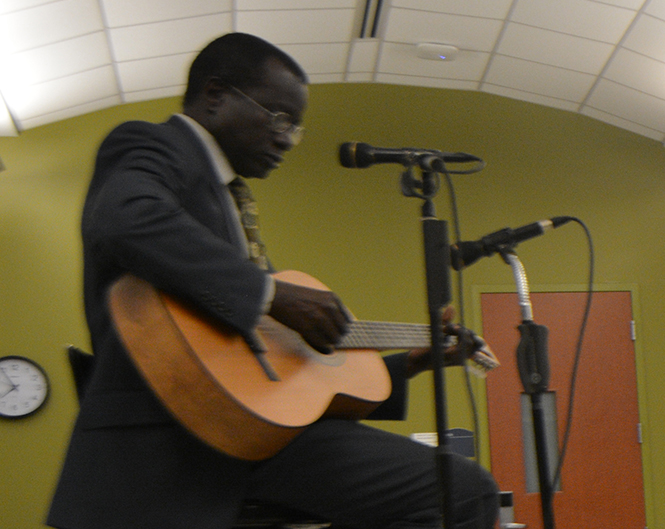African scholar explains how jokes, humor can be used to avoid conflict
Dr. Alphonse Ndiaye, a visiting Senegalese scholar, sings an original Senegalese song and plays guitar as part of a lecture in Oscar Ritchie Hall Thurs., Oct. 24. Photo by Jacob Byk.
Instead of fighting among themselves, ethnic groups in West Africa use humor and jokes to avoid conflict and develop friendships based on a shared heritage. This process, according to Boston University visiting scholar Alphonse Raphael Ndiaye, is what connects the African people in peace.
In a speech entitled “Pleasant Joking Relationships, Patronymic Names and Cross-border Citizenship in West Africa,” Ndiaye explained the concept of a joking relationship in context to African culture.
Ndiaye is director of the Senegal-based Leopold Sedar Senghor Foundation, also known as the Fondation Leopold Sedar Senghor, a UNESCO-affiliated organization that “aims to preserve and enrich the cultural heritage of Africa and promote research on applied culture in art, literature, human sciences and the teaching of national languages.”
A joking relationship, Ndiaye said, is formed between two individuals or two ethnic groups. Based on a shared ancestry, origin mythology, or geographic location, the relationship is sealed with an oath and honored by both parties.
Many of these bonds form through informal meetings of the groups who share a common family name but belong to different ethnicities. Once they realize that their similarities can overcome their difference, Ndiaye explained, a mutual peace can be achieved between individuals, villages and even entire nations.
These friendships are “a social cement that unites” different ethnic groups, Ndiaye said. “Because I can become the other without ceasing to be myself” is one way in which Ndiaye explained the relationship between individuals.
Many groups in Africa, Ndiaye explained, originate from one source and share many ancestral traditions that are not recognized when the groups are fighting each other. However, utilizing the mechanism of humor and jokes, an informal relationship can be formed based on that shared history.
“With joking relationships, there is no political or social status,” Ndiaye said. “Everyone is the same.” This unique form of association has succeeded in keeping peace between groups that ordinarily would be at war.
Ndiaye gave examples throughout African history. These included events from as far back as 1236, when the emperor of Mali promoted joking relationships as a way for politicians to manage ethnic diversity within the large empire, to conventions in 1990s where leaders recognized their shared history and declared peace with each other.
While this form of conflict resolution might work for African ethnic groups, Ndiaye said he has begun to look at cultures outside the continent for similar techniques. In Africa, programs in local schools have begun to teach journalists and radio hosts to explain and promote joking relationships amongst diverse ethnic groups.
The University Teaching Council, the Honors College and the Institute for Applied Linguistics, among others, sponsored Ndiaye’s visit, which will continue Friday, Oct. 25.
Ndiaye will be discussing the poetry of Leopold Sedar Senghor, the first president of Senegal and a world-renowned poet, on Friday. Combining the poetry of Senghor with songs sung in the native Seerer language, Ndiaye plans to teach students about African literature, culture and further discuss the advantages of forming joking relationships.
Contact Matthew Merchant at [email protected].



